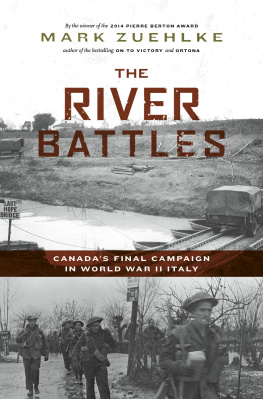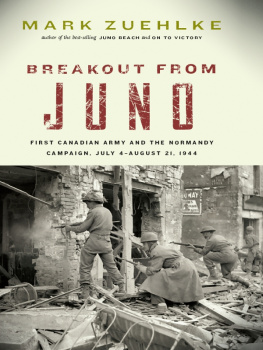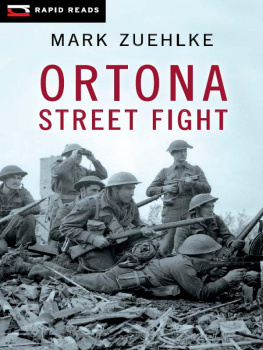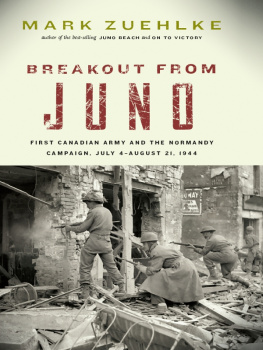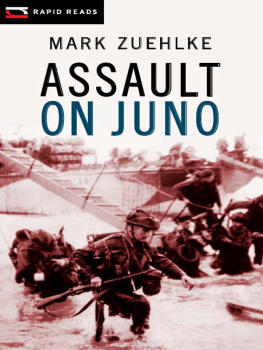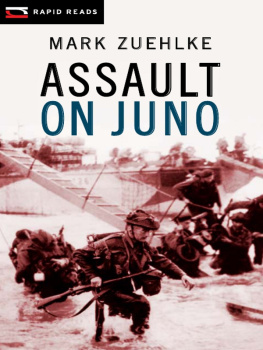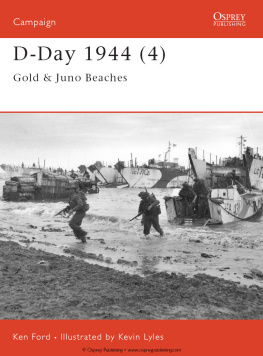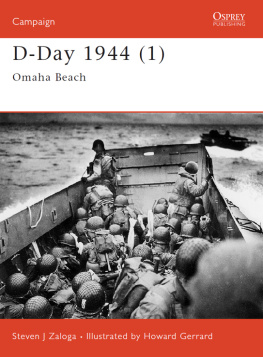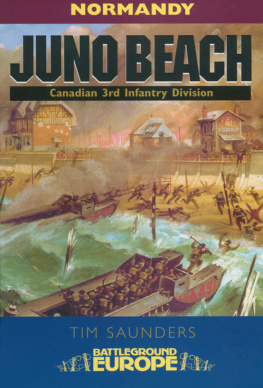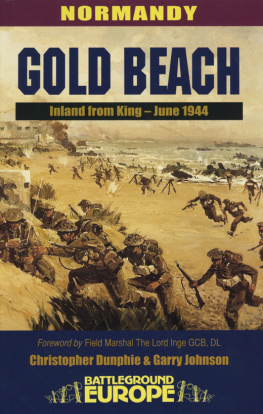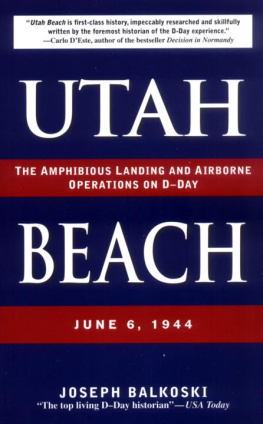Juno Beach
JUNO BEACH
CANADAS D-DAY VICTORY: JUNE 6, 1944
MARK ZUEHLKE

Copyright 2004 by Mark Zuehlke
U.S. edition 2005
03 04 05 06 07 5 4 3 2 1
All rights reserved. No part of this book may be reproduced,
stored in a retrieval system or transmitted, in any
form or by any means, without the prior written consent of the publisher or
a licence from The Canadian Copyright Licensing Agency (Access
Copyright). For a copyright licence, visit www.accesscopyright.ca
or call toll free to 1-800-893-5777.
Douglas & McIntyre
2323 Quebec Street, Suite 201
Vancouver, British Columbia
Canada V5T 4S7
www.douglas-mcintyre.com
National Library of Canada Cataloguing in Publication Data
Zuehlke, Mark
Juno Beach: Canadas D-Day victory, June 6, 1944 / Mark Zuehlke.
Includes bibliographical references and index.
ISBN 1-55365-050-6
1. World War, 19391945CampaignsFranceNormandy.
2. Canada. Canadian ArmyHistoryWorld War, 19391945. I. Title.
D756.5.N6Z83 2004 940.5421422 C2004-901051-4
Library of Congress information is available upon request
Editing by Elizabeth McLean
Jacket and text design by Peter Cocking
Jacket photograph Gilbert Alexander Milne, NAC PA137013
Typesetting by Rhonda Ganz
Printed and bound in Canada by Friesens
Printed on acid-free paper
Distributed in the U.S. by Publishers Group West
We gratefully acknowledge the
financial support of the Canada Council for the Arts, the British Columbia Arts Council,
and the Government of Canada through the Book Publishing Industry
Development Program (BPIDP) for our publishing activities.
Everything in war is simple, but the simplest thing is difficult.
CARL VON CLAUSEWITZ
What is War? A barbaric profession,
of which the only art is to be stronger
at a given place.
NAPOLEON, SEPTEMBER 6, 1812
ON THE EVE OF BORODINO
We came in at the beach, but twas hard to reach,
And many lost their lives.
We won our goal, but the terrible toll
Caused grief to far off wives.
BOMBARDIER R.A. EGO,
3RD CANADIAN INFANTRY DIVISION
Dip gently your scythe good reaper now
Oer the fields of the hallowed dead
For young men fought and young men died
Near the sea, where the earth is red.
CAPTAIN STANLEY E. HIGGS,
3RD CANADIAN INFANTRY DIVISION
[ CONTENTS ]
PREFACE
IN 2003, with the publication of The Gothic Line, I completed a three-volume history of the major battles fought by Canadians during World War IIs Italian campaign and was left to ponder the question, What next? My interest in Canadas experiences in World War II was undiminished and I suspected many a story still remained to be told. With the Italian campaign books, I had forayed onto a field of combat that had been little regarded by Canadian writersacademic or popular. So there had been a satisfaction in pulling back the mist that had begun to cloak that major historical period and shining a light upon it. Consequently, my first instinct was to look for other forgotten campaigns that had slipped for whatever reason from the national consciousness. Casting about through Canadian official accounts, the popular histories, and the academic treatises regarding various battles, I was surprised to find that areas once thought well mined appeared less so. My searches brought me to the Normandy invasion and more specifically June 6, 1944D-Day.
In my imagining, the Canadian experience of this seminal historic day had to have been well trodden by past writers, but on closer inspection I discovered the truth to be entirely different. In fact, Canadas D-Day was something treated only in passing by most writers looking at the Normandy invasion and subsequent campaign of almost three-month duration. Those books that were primarily dedicated to June 6 were slight, little more than leaflets. On the opposite side of the balance were a number of monolithic renderings relying on virtually untouched veteran accounts that were generally published by the associations of the regiments present on June 6. Although these latter works contained vast amounts of rich reminiscences, they were organized rather randomly so that readers were left with no context in which to align the described experiences.
A gap in the telling of Canadas D-Day story became evident. So into this gap I ventured and this book is the outcome.
In the Italian trilogy, I drew heavily on veteran accounts and approached many old soldiers who had never before been asked what happened to them on those fields of battle. By sifting their personal stories in with the historical records generated by the army at the time, it was possible to develop a dramatic narrative that depicted the course of the battle in detail but also enabled the reader to experience combat at a soldiers eye level. I have followed the same method here.
There are those, particularly academic historians, who consider veteran accounts suspect and so rely almost entirely on the official record. In my own experience, I have found that the veteran memory is trustworthy and, where the record is contradicted, tend to accept the account as rendered by the soldiers who lived it. Normally, it is possible to compare the versions of an event as recalled by several veterans and find sufficient common ground to develop a clear sense of what happened at a particular place and time. It is in this manner that events hinted at in the historical record but not explained are also revealed. Take, for example, a singular mention in the Sherbrooke Fusiliers Regiment war diary of its tanks carrying North Nova Scotia Highlanders off the beach aboard porpoises. What was this? Interviews with Fusiliers unearth the fact that ammunition bins were slung under their tanks for the landing. These were alternatively nicknamed porpoises or alligators. Then a North Nova veteran recounts how he and the other men in his section jumped onto an ammunition catamaran that was hooked to the back of the tank and were dragged like kids on a horse-drawn sleigh over snow off to their war in Normandys interior. A little mystery solved.
Veteran memory, of course, is dimming with the passage of time. These days, the researcher is generally left with fragments of events rather than a complete narrative retelling. But the fragment from one veteran, stitched onto the sliver of memory offered by another and informed by the official records and accounts makes it possible to develop a credible narrative. More so, I think, than if only veteran memory or official account is trusted. Inevitably, there are points where the collective veteran memory and that of the official record stand in stark disagreement, with no reconciliation possible. At those times, I have tended to trust my gut instinct and must confess that most of the time it is the veteran version that is accepted.
Ultimately, it is the veterans of D-Day who lived through one of the most intensely horrific long days in history, buried friends who did not, and carried the memory of June 6 for the rest of their lives. This is their story.
ACKNOWLEDGEMENTS
A SPECIAL DEBT OF THANKS is owed to the many veterans whose stories appear in this book. Without them, Juno Beach would not exist. It is impossible to mention all of the veterans here, but they are all listed in the bibliography. I would like to single out, though, Stan Richardson, who trusted his time-worn diary tracing his service as a telegraphist on the minesweeper HMCS
Next page

